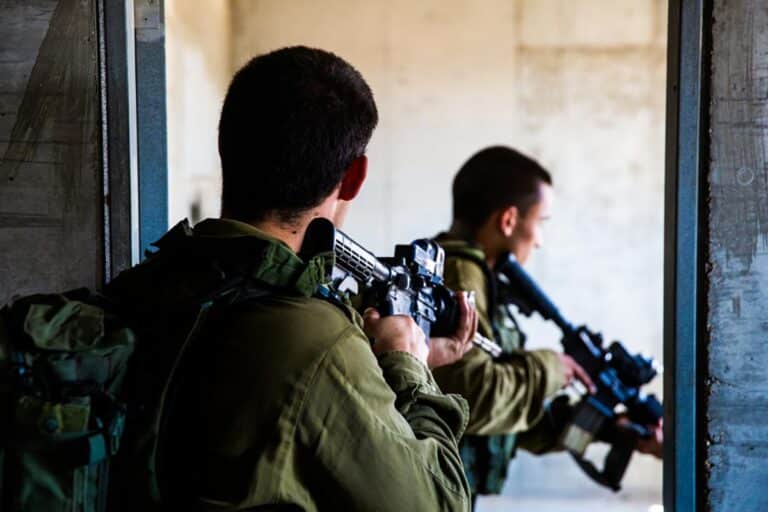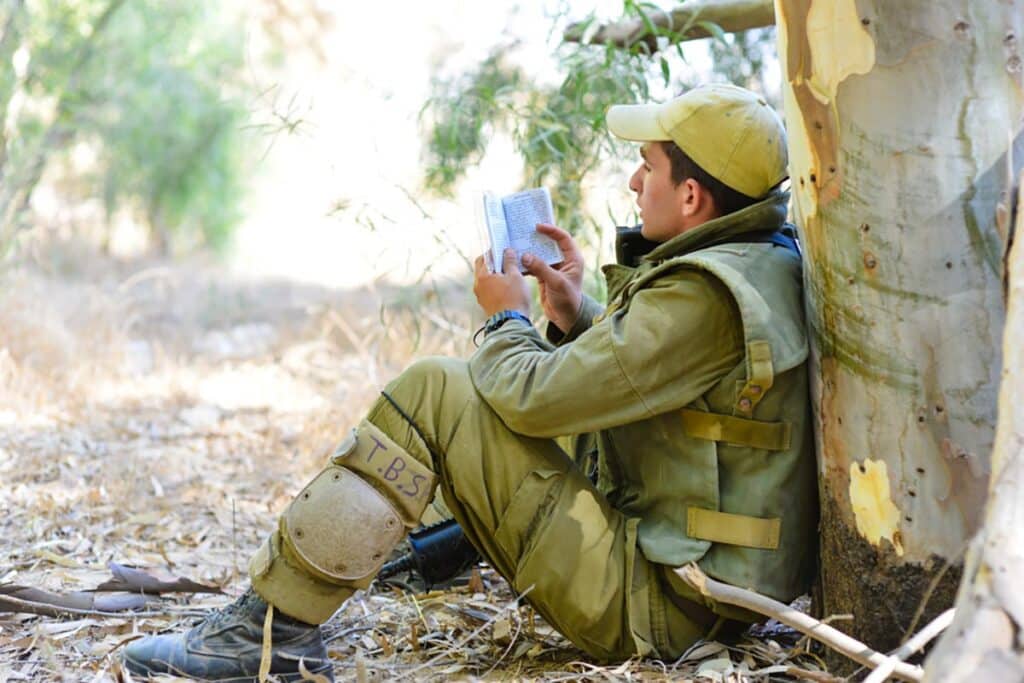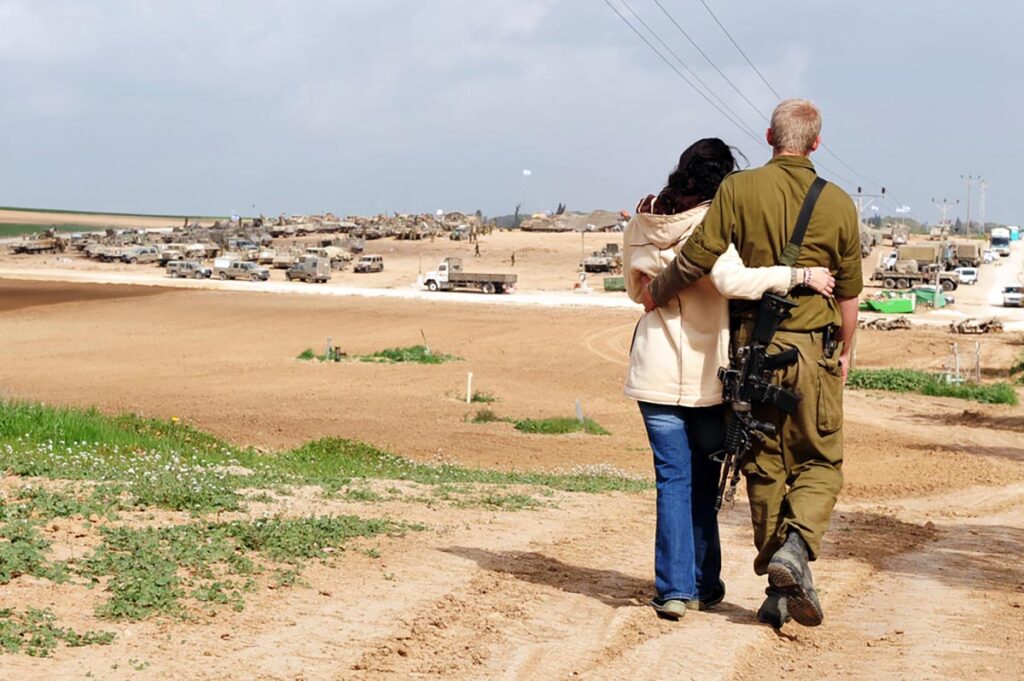
Being in a war is a hell of a thing. Whether you’re on the front lines, firing artillery or supporting from the rearguard, you will likely be exposed to some form of action at some point.
As combat soldiers in the IDF, a core part of our training is learning how to mentally compartmentalize, enabling us to stay laser-focused on accomplishing our mission. This is a critical survival tactic, and an excellent tool while you’re deep inside enemy territory.
Read more: Tips for Israeli soldiers on the front lines from a 2014 Gaza War veteran
But what happens once you’re out? Have you thought about things after the war?
No, you likely haven’t. And that’s alright, because neither did I when I served in Operation Protective Edge in 2014. Back then, I was a paratrooper in the IDF’s 890th brigade, operating as my unit’s top sharpshooter.
My military service with the IDF was quite the whirlwind. Within days of finishing our advanced training and receiving our red berets in early June, we were swept into a manhunt for three boys kidnapped by Hamas, who it later turned out had been murdered by their kidnappers.

Afterward, we sat on the Gaza border for several weeks and waited impatiently to see if we’d be going in on foot. We eventually proceeded to spend three weeks straight in Gaza. Our battalion fought deep into Khan Yunis, hunting Hamas terrorists and destroying tunnels and terror infrastructure.
Ultimately, the IDF chose to wrap the operation and we returned to Israel in early August. What had seemed like an eternity in Gaza came to an abrupt and jarring close. We celebrated being alive and took much-needed showers.
There was just one thing missing. Despite the immense psychological pressure and various traumas we had all experienced over the previous month, we were all left to our own devices when it came to coping with the “after.”
Before we knew it, our military services carried on, and to an extent, it seemed like the war had never even happened. Sure, there were stories and memories, but we all had to keep pushing forward as life continued.
It was only much later in my active service, toward the very end in 2015, that I realized how horribly mismanaged this immediate post-war experience had been.

There had been no real efforts to digest and understand what we had just been through. No forced psych evals, no debriefs with our commanders, not even a group chat. It was just business as usual.
Perhaps unsurprisingly, I struggled emotionally quite a bit after my release from the IDF and was ultimately diagnosed with PTSD in 2018. While I don’t feel this could have been avoided based on my experiences in Gaza, I do think it could have been mitigated somewhat by proper and immediate interventions following combat.
Yet for a basic infantryman like me, or even worse for reservist soldiers, no such luxury exists. It’s just back to “real life” once your job in Gaza is done.
But what does that mean? How is it possible to get back to “normal” after everything you’ve been through — after seeing the destruction, feeling the teeth-grinding booms, enduring the firefights, and living like an animal in one of the most hostile places on this earth? What does “normal” even look like anymore?
The reality is, despite being one of hundreds of thousands of soldiers taking part in this war, your experience is likely highly individual and unique. I recall having nearly identical experiences to some of my close comrades in 2014, and wondering how it was that they never showed the same PTSD symptoms that I did.
To this day, I find myself thinking, “If only I had done things differently.” “If only someone had taken responsibility for my well-being after the war.” The truth is, no one is going to do that except for you. Therefore, it is imperative that you take steps to protect yourself and prepare your mind for that inevitable “after.”
I’m hoping that I can help you avoid some of that friction, using my past experiences as a guide. I wish that I had done these four things during and after the war, rather than taking nearly five years of struggle and darkness to arrive where I am today:
Step 1: Write. It. Down.
I can’t stress enough how important it is to journal your experiences during combat. This is a step you can start taking now — it doesn’t have to wait until after you’re back in civilian clothes.
With today’s technology, there are a number of ways to accomplish this, though pen and paper is always a great option. Even if you just voice-note yourself for 30 seconds a day on WhatsApp, keep a record of your memories, stories, and experiences.
Even if you just voice-note yourself for 30 seconds a day on WhatsApp, keep a record of your memories, stories, and experiences.
You will kick yourself eternally for not doing this after what will likely be the most pivotal experience of your life. And I know, you might be saying to yourself, “This is too much effort,” or “I’ll remember everything after.” Believe me, you won’t.
Especially when it comes to traumas, your memories will become twisted, tainted, or even partially forgotten.
These recordings are critical both as a keepsake and to help you address any future postwar traumatic issues that you may endure. They also help you to begin digesting and understanding your experiences in real-time.
Step 2: Talk about it.
Talk is cheap, they say, and in this case, that’s a good thing. Talking about your experiences, both during and after the war, will help you assimilate what you’ve gone through into the fabric of your consciousness.
Our experiences during combat can be likened to mental toxins. Left untouched, they can seep into our brains and corrupt our very moods, personalities, and emotions.
Yet once you begin to acknowledge and work through what you’ve experienced, the toxins can be broken down, digested, and eventually worked out of your body. Some remnants may remain, but by going through this “acknowledgment” process, you’ll be much better equipped to deal with these leftovers.
Once you begin to acknowledge and work through what you’ve experienced, these “mental toxins” can be broken down, digested, and eventually worked out of your body.
Talking about it may take many forms. One thing that was particularly helpful for me was sitting around with other veteran friends and swapping funny stories from our time inside Gaza. While this might seem a bit blasé, it did help us all to feel more normal. (Plus, there’s nothing wrong with a bit of foxhole humor.)
Other sources of talking might be therapy with a professional who specializes in trauma, speaking with your commanders as part of a detailed debrief, or even unburdening yourself to some of your family members. If you’re looking for psychological support, check out Trauma4Good and Natal.
The family part can be a bit tricky though, which leads me to the next step.
Step 3: Keep your family in the loop.
Your family will likely want to support you and be there for you as you return to your life after the war. Many of you reading this may be married and even have children, as well as parents, siblings and extended family. They are all worried about you, care for you, and just want you to be alright.
However, it may feel alienating and frustrating to have all of these people who didn’t experience what you went through hovering about. Despite their best intentions, how can they possibly understand what it means to be in Gaza?
This is normal and to be expected. You will likely be experiencing a wide range of emotions and be in moods you wouldn’t normally have been in once you’re back. You may even feel irrational, resentful, or have other negative feelings toward those who are closest to you. This is normal.
That doesn’t make it any easier, but one thing you can do is let your family know how you’re feeling. Don’t hide your emotions from them and try not to retreat into your own shell.
Even if you don’t feel you can express yourself properly yet, just let them know where your headspace is at. Let them know if you need to be left alone, or if you need their help finding resources in aiding your return to civilian life.
One thing you can do is let your family know how you’re feeling…Even if you don’t feel you can express yourself properly yet, just let them know where your headspace is at.
Most importantly, express to them that you are grateful to have them in your life, even if your moods and actions don’t always show it.
You’re transitioning back from intense day-to-day survival mode to the safety and security of normal life, which isn’t just a switch that can be turned on and off. It takes time, and as long as you and your loved ones are in lockstep on that, it will facilitate you getting back into your groove.
Step 4: Establish a routine and stick to it.
This last bit of advice is perhaps the most enduring and valuable I can offer. You’ve just left one of the most dangerous, chaotic and hellish places you will ever be in. Such extremes may become a norm for a while, but they are far from what “normal” life entails.
Part of assimilating back into civilian life and mitigating trauma as much as possible is implementing predictability and stability back into your life. This can take many forms depending on your likes and preferences.
Part of assimilating back into civilian life and mitigating trauma as much as possible is implementing predictability and stability back into your life.
For me, having extremely regimented bedtimes and wake-up times has been very helpful, as well as predictable morning routines including gym, breakfast, and a shower. Even small mundane tasks, like a set time for checking your email in the morning, contribute to building a predictable lifestyle.
This may sound anathema to some of you who like to live more freely, but this structure, even as a temporary change until you’re back on your feet, can mean the difference between emotional regulation and dysregulation.
Conclusion
At the end of the day, you’ve just been through a terrifying, intense and prolonged experience that many people will never understand. It can be isolating and frustrating, especially when you’re trying to reconcile everything from Gaza with your everyday life back home.
It’s not easy, but we all need you as a civilian just as much as we needed you when you were a soldier. Most importantly, you deserve the best shot at peace and happiness after fighting so hard to preserve it these past few months. So don’t hesitate to take some of these steps, and don’t hesitate to ask for help. It won’t diminish your standing in any of our eyes. Rather, we will appreciate you more for it.
Until then, stay safe, keep your heads down, and Am Yisrael Chai.
Still serving in Gaza? Check out these survival tips for IDF soldiers on the front lines.
Originally Published Jan 3, 2024 08:16PM EST
